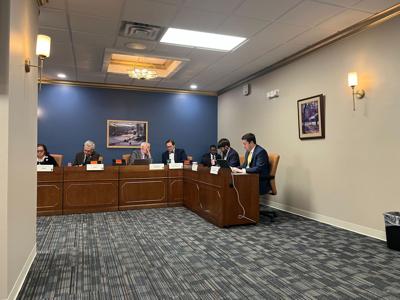INDIANAPOLIS—Pharmacists could prescribe women birth control under a bill being reviewed by the Indiana House Public Health Committee.

The House Public Health Committee on Tuesday discussed House Bill 1568, which would allow pharmacists to prescribe and dispense birth control patches and oral contraceptives to those 18 and older.
Authored by Rep. Elizabeth Rowray, R-Yorktown, House Bill 1568 would allow pharmacists to prescribe and dispense birth control patches and oral contraceptives to those 18 and older.
Rowray said the bill’s genesis stems from last summer’s special session and the controversy surrounding Senate Bill 1, which banned all abortions with few exceptions for Hoosiers.
“We [legislators in the special session] thought that having access to hormonal contraceptives as readily available as possible would be one step in making sure we didn’t have those unintended pregnancies,” Rowray said.
The authors said they’re planning an amendment based on some concerns of local advocacy groups and organizations. The committee heard HB 1568 on a time crunch and was only able to allow testimony from three individuals for a maximum of three minutes each.
Jodi Smith, an advocate for Indiana Right to Life, said her organization finds some issues with the bill’s lack of specificity in ensuring women trying to receive contraceptives don’t use the medication to cause abortions.
The organization has previously spoken out against the use of mifepristone, a drug that, when used in combination with misoprostol, can cause a self-administered abortion. The FDA recently updated the labeling for the drug to make it so that pharmacists can dispense it.
“Additionally, there are not the proper safeguards in place to ensure that a pharmacist who may abuse this new authority are held accountable for their actions as physicians are,” Smith said.
In order for the organization to support the bill, Smith said both issues would need to be worked on.
Andreia Alexander stood before the committee on behalf of the Indiana State Medical Association as an at-large member. She said that ISMA would be willing to support the bill with some other changes enacted.
Alexander said the organization is concerned that physicians would not be involved in the process, stating that “patients receive the highest quality of care when a physician is involved with their care.”
She also mentioned that ISMA has multiple recommendations for Rowray to consider in working on the amendment.
One involves a requirement that if a nurse practitioner or physician's assistant is in the building, the pharmacist has to suggest that the woman attempting to receive contraceptives consult with that person to get the patient’s history, a blood pressure check and the prescription.
ISMA also recommends that patients have a time frame prior to filling a prescription to get evaluated by a physician to screen for potential health problems.
Alexander added that there also should be language in the bill to allow for “women to have greater access to alternative contraceptive options, such as … long-acting, reversible contraceptives.”
Finally, ISMA recommends including a mechanism to track the usage and referral of patients as well as making specialists such as OBGYNs a part of the training process for pharmacists.
Rep. Rita Fleming, D-Jeffersonville and a physician, commented on Alexander’s recommendations, stating that physicians often don’t have the open availability that pharmacists do.
“How many physicians’ offices, primary care doctors, OBGYNs, women's health providers are open on Saturdays, Sundays, holidays and evenings?
“Pharmacies are open very often during those days,” Fleming said.
Fleming also said a recent study revealed that 53% of pregnancies in Indiana are unintended, and she believes this bill could help to combat that statistic for those who may be uninsured or not able to visit a physician.
Veronica Vernon, president of the Indiana Pharmacy Association, took up the last three minutes of the meeting with what IPA would like to see changed in the bill.
She recommended including a section about payment, which would call for pharmacists to bill insurance providers the same way physicians do for regular doctor visits.
As seen in more than 20 other states with similar practices in their pharmacies, it takes about 30 minutes for a pharmacist to assess the patient on their birth control needs, according to Vernon. She believes this time should be billed to insurance. Over 35,000 pharmacists are currently doing this across the country.
The authors of the bill are working on their amended version currently, and it will be brought before the Public Health Committee during their next meeting.






(0) comments
Welcome to the discussion.
Log In
Keep it Clean. Please avoid obscene, vulgar, lewd, racist or sexually-oriented language.
PLEASE TURN OFF YOUR CAPS LOCK.
Don't Threaten. Threats of harming another person will not be tolerated.
Be Truthful. Don't knowingly lie about anyone or anything.
Be Nice. No racism, sexism or any sort of -ism that is degrading to another person.
Be Proactive. Use the 'Report' link on each comment to let us know of abusive posts.
Share with Us. We'd love to hear eyewitness accounts, the history behind an article.